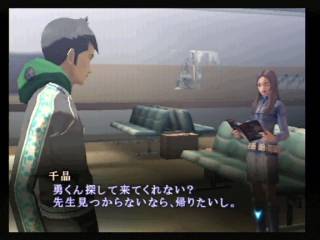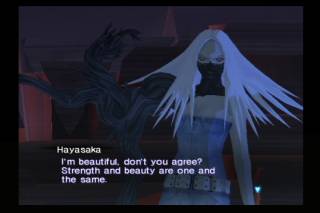Fighting JRPG Stereotypes #1: Shin Megami Tensei: Nocturne
By Hailinel 29 Comments
The JRPG genre is, like any other genre, rife with cliche. The spikey-haired teen hero. Amnesia. A game of repeatedly pressing X. Combat that hasn't evolved in a decade. Given recent heated debate on this topic (which is neither new, nor likely to go away any time soon), I thought it might be a good idea to revisit some noteworthy titles in the genre and see exactly how stereotypical they are. First up: Shin Megami Tensei: Nocturne.
Basic Premise

The question Nocturne poses isn't how will the world be saved, but rather "Now what?"
Cliche Factor: Non-existent. Nocturne isn't a game about saving the world, but rather finding your place in a destroyed world preparing to be reborn, whether that be by shaping the new reality with the power of a Reason, or by forging your own path.
The Protagonist
The protagonist in Nocturne is a nameless teenager to whom the player can give a first and last name, as well as a nickname. As the Demi-Fiend, the few remaining humans fighting to establish their Reasons each want his help to fulfill their own agendas. He is allowed to follow any of those paths, or none, at the player's choice. He wields no weapon save his fists; his only equipment are the magatama, parasites that grant him stat boosts, elemental strengths and weaknesses, and the ability to learn new skills when leveling up.
Cliche Factor: The Demi-Fiend is definitely a "chosen one," in that a character chooses to transform him into the Demi-Fiend, but he was not born into his destiny. His equipment and skill growth are also unusual for the typical standards of the genre.
The Party
The player's party is composed of the Demi-Fiend and a cadre of demons that join his side through either negotiation or fusion. The character Dante from Capcom's Devil May Cry also appears as an optional party member, but none are of significant story importance. The player receives a Game Over only if the Demi-Fiend falls in battle. The large number of demons in the game ensures that no two players are likely to play through the game with the exact same line-ups.
Cliche Factor: The demon party member aspect in Nocturne is not entirely unlike Pokemon, but it's also a far cry from the rogue's gallery of standard RPG party member tropes.
The Combat
Combat Style: Turn-based
In Nocturne, pressing X until the victory screen appears is asking for death. Combat is predicated on understanding the elemental strengths and weaknesses of both the enemy and the player's party. Stat boosting/reducing skills don't reach their full effectiveness until multiple castings have been completed. Turns aren't strict one-and-done affairs, either, as effective exploitation of enemy weaknesses extends the player's turn. (Of course, the same holds true for the enemies.) The combat is also exceptionally brutal. Failing to take the Demi-Fiend's weaknesses into account can lead to a swift demise.
Cliche Factor: This game in no way subscribes to the notion of making victory as easy as pressing X until all enemies are dead. Even a random encounter can pose a significant threat if you aren't paying attention.
Final Thoughts
